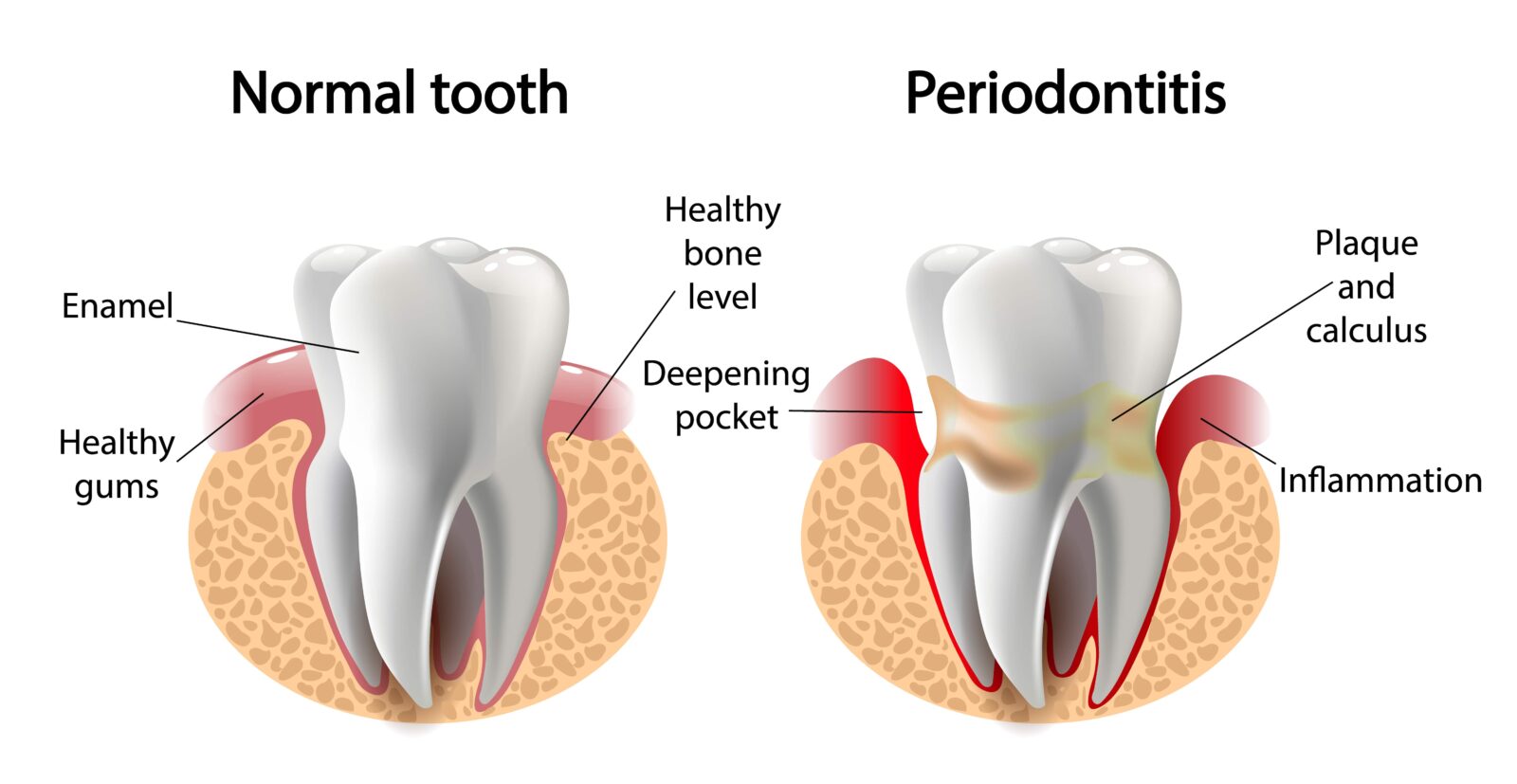Gum disease is a common condition that can seriously affect your dental health. If left untreated, it will cause pain and discomfort as well as the loss of teeth. It’s important to know the signs of gum disease so you can take steps to prevent it from getting worse. In this post, we’re going to talk about what causes gum disease, how it affects your oral health, and how you can detect signs of the two forms: gingivitis and periodontitis.
Gum disease is caused by a buildup of plaque and tartar on your teeth. This bacteria can cause inflammation and irritation in the gums, which causes them to become infected. There are two forms of gum disease: gingivitis and periodontitis. Gingivitis is the milder form of gum disease that primarily affects the gum tissue. If left untreated, however, gingivitis can progress into periodontitis, which affects the tissues that support your teeth such as the periodontal ligament, cementum, and alveolar bone. Advanced periodontitis causes these structures to deteriorate, which will eventually cause the teeth to loosen and fall out.
The best way to prevent complications from gum disease is to learn how to recognize the symptoms of gingivitis so you and your dentist can prevent it from progressing into periodontitis. When caught in the early stages, gum disease usually responds well to treatment. Therefore, here are some of the key signs that indicate a trip to your dentist’s office is needed:

Abnormal Gum Appearance
One of the first things you may notice with early gum disease is a change in the appearance of your gums. Healthy gums are a coral pink color, are attached firmly to the teeth, and completely cover the tooth roots. Gums affected by gum disease, however, tend to be deep pink or red in color. They may also be swollen and bleed easily when you brush or floss your teeth. These subtle changes in your gums’ appearance occur as a result of inflammation caused by the bacteria that cause gum disease.
Gum Recession
Another common sign of gum disease is gum recession. This occurs when the gums pull away from the teeth, exposing more of the tooth’s surface. Gum recession can be caused by a number of factors such as brushing your teeth too hard, aggressive flossing, and periodontal disease. It’s important to have your dentist check for gum recession, because it’s an indication that gum disease is present.
In the beginning, gum recession may be hard to spot since it happens slowly. If your gums appear to be loose around the base of your teeth, then this could indicate the start of gum recession. When the gums start to recede, this causes pockets to form between the tooth root and gum tissue. As bacteria accumulate in these pockets, this will make gum recession worse. The more your gums recede, the longer your teeth will appear.
Pain and Discomfort
Gum pain can also occur as the result of inflammation from gum disease, although this generally happens in cases where there is severe inflammation. Most cases of gum disease don’t cause pain until the later stages. In these cases, pain takes the form of tenderness in the gums and pain while chewing. However, tooth sensitivity is another type of pain that can be indirectly caused by gum disease. As the gums recede, they expose the tooth roots. The roots are not covered with enamel, which makes them susceptible to pain from hot and cold foods and drinks. If you have sensitive teeth, then it could mean that your gums are receding due to gum disease.
Bad Breath
Halitosis, or bad breath, is often one of the earliest signs of gum disease. This occurs when bacteria that live in plaque and tartar produce a foul smelling substance called volatile sulphur compounds (VSCs). VSCs are the main cause of bad breath and can be detected even when your mouth is closed. If you have bad breath that doesn’t go away no matter how often you brush or floss your teeth, then it’s likely caused by gum disease.
In Conclusion
Although there are many signs and symptoms of gum disease, the key is to recognize them early on. The earlier you catch it, the more likely your dentist can help you treat it effectively. If you’re concerned that you might have a case of gum disease, then be sure to schedule an appointment at Sedation Dental Care in Raleigh before they develop into something more serious such as periodontitis or teeth loss! As always, our team is happy to answer any questions and provide assistance when needed.
